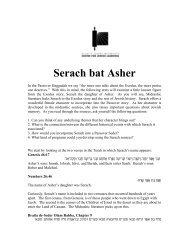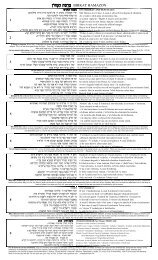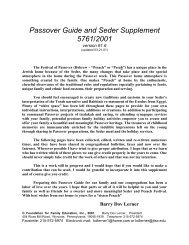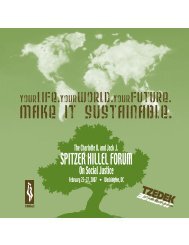Teshuva & the Dilemma of Free Will - Hillel
Teshuva & the Dilemma of Free Will - Hillel
Teshuva & the Dilemma of Free Will - Hillel
You also want an ePaper? Increase the reach of your titles
YUMPU automatically turns print PDFs into web optimized ePapers that Google loves.
<strong>Teshuva</strong> & The <strong>Dilemma</strong> <strong>of</strong> <strong>Free</strong> <strong>Will</strong><br />
Classic Medieval Sources for <strong>the</strong> New Year:<br />
Edited by<br />
Rabbi David Ebstein<br />
Rabbi Simcha Bunim said to his chasidim: Man's great transgression Is not <strong>the</strong> sins that he<br />
commits-temptation is strong and his power is weak. Man's great transgression is that at<br />
every instant he could turn to God -and that he does not.'<br />
YOUR TEXT NAVIGATOR<br />
<strong>Teshuva</strong>h, which ostensibly means repentance, is a multi-valenced word. On <strong>the</strong> one hand, it<br />
implies <strong>the</strong> literal meaning <strong>of</strong> <strong>the</strong> Hebrew, which is 'return.' To what are we returning?<br />
Judaism conceives <strong>of</strong> <strong>the</strong> relationship between man and God as a covenant between two<br />
partners, each <strong>of</strong> whom has a role to play in bringing <strong>the</strong> world to perfection. When we sin<br />
against God or man, we violate this covenant, <strong>the</strong>reby rupturing normal, covenantal relations.<br />
<strong>Teshuva</strong>h is <strong>the</strong> process by which this break is repaired and <strong>the</strong> covenant renewed, 'returning'<br />
us to a healthier relationship.<br />
On a personal level, teshuvah is <strong>the</strong> process <strong>of</strong> asking for forgiveness from those whom we<br />
have wronged: friends, spouses, children and neighbors. Where necessary we must make<br />
restitution against those we have harmed. According to one <strong>of</strong> <strong>the</strong> greatest thinkers <strong>of</strong> this<br />
century, Rabbi Joseph Soloveitchik, teshuvah is an "opportunity to liberate oneself from <strong>the</strong><br />
failures <strong>of</strong> <strong>the</strong> past and demonstrate that <strong>the</strong> laws <strong>of</strong> psychological determinism need not<br />
control human destiny." (The Living Covenant, Rabbi David Hartman, page 75). <strong>Teshuva</strong>h is<br />
a process, <strong>the</strong>refore, <strong>of</strong> self-renewal and self-creation that comes about as a result <strong>of</strong><br />
reflection and a powerful resolution to effect real change in one's life. Our tradition seeks to<br />
apply this process to our lives as individuals, and to our communal and national life. There is<br />
a feeling <strong>of</strong> great power when a Jewish community examines itself and <strong>the</strong>n seeks to change<br />
and rectify matters.<br />
Rosh Hashanah is a reminder to begin this process <strong>of</strong> teshuvah, a process ideally practiced<br />
year round. But alas, we are only flesh and blood-we make mistakes and we forget. That is<br />
why we have a concentrated time period-10 days-between Rosh Hashanah and Yom Kippurwhen<br />
we ask God and our fellow man for forgiveness.<br />
The process <strong>of</strong> teshuvah is <strong>of</strong>ten a difficult one that forces us to confront our foibles and<br />
faults. One <strong>of</strong> <strong>the</strong> greatest scholars, rabbis and philosophers ever produced by <strong>the</strong> Jewish<br />
people, Maimonides, wrote a magnificent treatise on teshuva in his 14 volume work, <strong>the</strong><br />
Mishneh Torah. Let us examine Maimonides’ notions <strong>of</strong> teshuva and try to understand it in
<strong>the</strong> context <strong>of</strong> <strong>the</strong> philosophical notion <strong>of</strong> free choice. Read <strong>the</strong> following texts with your<br />
study partner. Make sure you examine <strong>the</strong>m carefully, and <strong>the</strong>n discuss its meaning. Can<br />
you glean wisdom from <strong>the</strong>se texts for your own life?<br />
Maimonides, The Laws <strong>of</strong> Return, 2:2<br />
What is complete teshuvah? A person who confronts <strong>the</strong> same situation in which he sinned when he<br />
has <strong>the</strong> potential to commit [<strong>the</strong> sin], yet he abstains and does not commit it because <strong>of</strong> his teshuvah<br />
alone and not because <strong>of</strong> fear or a lack <strong>of</strong> strength.<br />
For example, a person engaged in illicit sexual relations with a woman. Afterwards, <strong>the</strong>y<br />
meet in privacy... while his love for her and his physical desire still persists. Never<strong>the</strong>less, he<br />
abstains and does not transgress. This is a complete ba’al-teshuva. (Note: Ano<strong>the</strong>r example<br />
would be someone who violates <strong>the</strong> law while trading on <strong>the</strong> stock market. He is caught and<br />
punished. After being released from jail he once again is able to trade stocks, and make lots<br />
<strong>of</strong> money by breaking <strong>the</strong> low. If he is tempted once again to violate <strong>the</strong> some law, but<br />
refrains from doing so, he is considered a complete ba’al teshuva.)<br />
If he does not repent until his old age, at a time when he is incapable <strong>of</strong> doing what he did<br />
before, even though it is not a high level <strong>of</strong> repentance, he is a ba'al teshuvah. (In o<strong>the</strong>r<br />
words, if he repents when it is no longer possible to commit <strong>the</strong> original transgression he<br />
cannot be classified as a complete ba'al-teshuva).<br />
Even if he transgressed throughout his entire life and repented on <strong>the</strong> day <strong>of</strong> his death and<br />
died in repentance, all his sins are forgiven as [Ecclesiastes] continues: "Before <strong>the</strong> sun, <strong>the</strong><br />
light, <strong>the</strong> moon, or <strong>the</strong> stars are darkened and <strong>the</strong> clouds return after <strong>the</strong> rain..." This refers to<br />
<strong>the</strong> day <strong>of</strong> death. Thus, we can infer that if one remembers his Creator and repents before he<br />
dies, he is forgiven."<br />
What constitutes teshuvah? That a sinner should abandon his sins and remove <strong>the</strong>m from his<br />
thoughts, resolving in his heart, never to commit <strong>the</strong>m again as [Isaiah 55: 7] states "May <strong>the</strong><br />
wicked abandon his ways..." Similarly, he must regret <strong>the</strong> past as (Jeremiah 31:18] states:<br />
"After I returned, I regretted."<br />
A person must reach <strong>the</strong> level where He Who knows <strong>the</strong> hidden (God) will testify concerning<br />
him that he will never return to this sin again as (Hosea 14:4] states: "We will no longer say<br />
to <strong>the</strong> work <strong>of</strong> our hands: 'You are our gods"'.<br />
He must verbally confess and state <strong>the</strong>se matters which he resolved in his heart.<br />
YOUR MAIMONIDES NAVIGATOR<br />
1. What is <strong>the</strong> difference between “teshuvah” and a “complete teshuvah”?<br />
2. Why does Maimonides discuss “complete teshuvah” before “teshuvah”? How do you<br />
explain <strong>the</strong> order he chose?<br />
3. Some commentators find it problematic that one can commit transgressions <strong>the</strong>ir entire<br />
life and repent right before <strong>the</strong>y die. Do you? What did Maimonides mean by this<br />
seemingly extraordinary ruling?<br />
4. Cite <strong>the</strong> stages that one must go through to repent.<br />
2
5. We are supposed to "abandon our sins and remove <strong>the</strong>m from our hearts." Discuss this<br />
phrase, explain it, and <strong>of</strong>fer examples.<br />
6. Note how <strong>the</strong> beginning <strong>of</strong> <strong>the</strong> first teaching says, "What is complete teshuvah?”<br />
Maimonides quoted a question he found in <strong>the</strong> Talmud (Yorna 86b) but added <strong>the</strong> word<br />
“complete.” Originally <strong>the</strong> question was simply, “What is teshuvah?” What is going on<br />
here-why did Maimonides add <strong>the</strong> word “complete"? What do you think <strong>of</strong> his<br />
definition <strong>of</strong> “complete teshuvah”? Offer your own definition <strong>of</strong> a "complete ba'al<br />
teshuvah."<br />
Commenting on <strong>Hillel</strong>'s <strong>of</strong>ten quoted phrase, 'if not now, when?" (Pirkei Avot 1:14)<br />
Rabbi Jonah Gerondi wrote:<br />
Rabbi Jonah Gerondi (a popular medieval Jewish ethicist)<br />
"If not now, when?" i.e., I cannot afford to delay for one or two days my exertions on behalf <strong>of</strong> <strong>the</strong><br />
perfection <strong>of</strong> my soul. ...When perfection <strong>of</strong> <strong>the</strong> soul is delayed, <strong>the</strong> evil inclination grows<br />
stronger...and self-improvement becomes difficult ... It may be that one's days will not be prolonged<br />
and that one will die before one has rendered his portion <strong>of</strong> repentance..."<br />
YOUR RABBI JONAH NAVIGATOR<br />
1. Compare and contrast this statement to <strong>the</strong> ones above by Maimonides.<br />
How do you understand <strong>the</strong> phrases “perfection <strong>of</strong> <strong>the</strong> soul” and “self-<br />
improvement”?<br />
2. It is human nature to avoid looking at our faults. A true cheshbon hanefesh (selfexamination<br />
<strong>of</strong> our behavior) may force us to contend with things that we would prefer<br />
to avoid. How do you propose to convince o<strong>the</strong>rs that this is a worthwhile process? Is it<br />
possible to avoid <strong>the</strong> pain?<br />
3. What are some o<strong>the</strong>r ways you can understand this famous phrase by <strong>Hillel</strong>?<br />
Midrash Pesikta Rabbati 44:9 (An early medieval collection <strong>of</strong> homilies based on<br />
Biblical verses)<br />
Repentance requires both a human initiative and a response from God; Consider <strong>the</strong> parable <strong>of</strong> a<br />
prince who was far away from his fa<strong>the</strong>r-a hundred day's journey away. His friends said to him:<br />
Return to your fa<strong>the</strong>r. He replied: I cannot, I do not have <strong>the</strong> strength. Thereupon, his fa<strong>the</strong>r sent<br />
word to him saying: Come back as for as you are able, and I will go <strong>the</strong> rest <strong>of</strong> <strong>the</strong> way to meet you.<br />
So <strong>the</strong> Holy One says to Israel: "Return to me, and I shall return to you" (Malachi 3:7).<br />
YOUR MIDRASH NAVIGATOR<br />
1. This midrash assumes that teshuvah must take place not only between man and man, but<br />
also between man and God. How do you understand <strong>the</strong> idea that we commit<br />
transgressions against God?<br />
2. Evaluate <strong>the</strong> God <strong>of</strong> this midrash, who meets his son half way. Do you like this<br />
solution? Is this an example <strong>of</strong> a weak God? A clever God?<br />
3
3. The foundation <strong>of</strong> this midrash is that <strong>the</strong>re is a relationship between man and God.<br />
What do you think <strong>of</strong> this metaphor? Does it reflect reality, as you understand it?<br />
Explain your view.<br />
4. Apply this midrash to human relations. Is this good advice? Offer examples.<br />
Duties <strong>of</strong> <strong>the</strong> Heart, Bachya Ibn Pakuda (A popular medieval work <strong>of</strong> Jewish ethics)<br />
The man who fulfills all <strong>the</strong> conditions <strong>of</strong> repentance, whose mind has overcome his desire,<br />
who constantly makes a reckoning with himself, fears his Creator and is ashamed before<br />
Him. He perceives <strong>the</strong> greatness <strong>of</strong> his sins and errors and understands <strong>the</strong> distinction <strong>of</strong> Him<br />
whose orders he has disobeyed and whose commandments he has failed to perform. He fixes<br />
his eyes always on his sins, he faces <strong>the</strong>m continuously, he repents <strong>of</strong> <strong>the</strong>m and asks God's<br />
pardon for <strong>the</strong>m as long as he lives and to <strong>the</strong> end <strong>of</strong> his days. This man deserves to be<br />
rescued by God....<br />
YOUR DUTIES OF THE HEART NAVIGATOR<br />
1. Is it possible to completely overcome our evil desires?<br />
2. What does Bachya mean by <strong>the</strong> phrase "fears his Creator"?<br />
3. According to Bachya, a true penitent must always face his transgressions. How can this<br />
process produce negative effects? Discuss.<br />
Back to Maimonides, Hilchot <strong>Teshuva</strong> and a difficult philosophical issue-free will. Read<br />
this text with your partner(s).<br />
MAIMONIDES HILCHOT TESHUVA 5:1-4 (The Laws <strong>of</strong> Return)<br />
1. <strong>Free</strong> will is granted to all men. If one desires to turn himself to <strong>the</strong> path <strong>of</strong> good and be righteous,<br />
<strong>the</strong> choice is his. Should he desire to turn to <strong>the</strong> path <strong>of</strong> evil and be wicked, <strong>the</strong> choice is his.<br />
This is [<strong>the</strong> intent <strong>of</strong>] <strong>the</strong> Torah's statement (Genesis 3:22): "Here, <strong>the</strong> human has become<br />
like one <strong>of</strong> us, in knowing good and evil." The species <strong>of</strong> man become singular in <strong>the</strong> world<br />
with no o<strong>the</strong>r species resembling it in <strong>the</strong> following quality: that he can, on his own initiative,<br />
with his knowledge and thought, know good and evil, and do what he desires. There is no one<br />
who can prevent him from doing good or bad...<br />
2. A person should not entertain <strong>the</strong> <strong>the</strong>sis held by fools ... that, at <strong>the</strong> time <strong>of</strong> a man's<br />
creation, God decrees whe<strong>the</strong>r he will be righteous or wicked.<br />
This is untrue. Each person is fit to be righteous like Moses, our teacher, or wicked like<br />
Jerobam. Similarly, he may be wise or foolish merciful or cruel, miserly or generous, or<br />
acquire any o<strong>the</strong>r character traits. There is no one who compels him, sentences him, or leads<br />
him towards ei<strong>the</strong>r <strong>of</strong> <strong>the</strong>se two paths. Ra<strong>the</strong>r, he makes his own choice."<br />
3. This principle is a fundamental concept and a pillar [on which rests <strong>the</strong> totality] <strong>of</strong> <strong>the</strong><br />
Torah and mitzvot as Deuteronomy 30:15 states: "Behold, I have set before you today life<br />
and good, death and evil." Similarly, [Deuteronomy 11:26] states "Behold, I have set before<br />
you today <strong>the</strong> blessing and <strong>the</strong> curse," implying that <strong>the</strong> choice is in your hands.<br />
4. Were God to decree that an individual would be righteous or wicked or that <strong>the</strong>re would<br />
be a quality which draws a person by his essential nature to any particular path [<strong>of</strong><br />
behavior]... how could He (God) command us to do this or to do that?"<br />
4
According to this mistaken conception, from <strong>the</strong> beginning <strong>of</strong> man's creation, it would be decreed<br />
upon him, or his nature would draw him to a particular quality and he could not depart from it. [If this<br />
were <strong>the</strong> case] what place would <strong>the</strong>re be for <strong>the</strong> entire Torah?<br />
One must know that everything is done in accordance with His will and, never<strong>the</strong>less, we are<br />
responsible for our deeds.<br />
How is this apparent contradiction resolved? Just as <strong>the</strong> Creator desired that <strong>the</strong> elements <strong>of</strong> fire and<br />
wind rise upward and [those <strong>of</strong>] water and earth descend downward...He desired that man have free<br />
choice and be responsible for his deeds, without being pulled or forced. Ra<strong>the</strong>r, he, on his own<br />
initiative, with <strong>the</strong> knowledge that God has granted him, will do anything that man is able to do.<br />
Therefore, he is judged according to his deeds. If he does good, he is treated with beneficence. If he<br />
does evil, he is treated harshly...<br />
YOUR MAIMONIDES NAVIGATOR<br />
1. How do you understand <strong>the</strong> concept <strong>of</strong> freedom <strong>of</strong> choice? What does it mean for you in<br />
terms <strong>of</strong> your own life?<br />
2. If all behavior was predetermined and God had a plan for all people and things, <strong>the</strong>n<br />
Torah would be superfluous. Why? Explain Maimonides' argument. Do you agree?<br />
3. If everything were predetermined, how would this affect human initiative?<br />
4. Elsewhere, Rambam states ano<strong>the</strong>r corollary <strong>of</strong> this philosophical dilemma: If God<br />
knows that a person will be righteous, but a person exercises his free will and<br />
transgresses, <strong>the</strong>n God's knowledge is incomplete. Is this solution acceptable? Why<br />
does Rambam reject it?<br />
5. Instead <strong>of</strong> saying that God's knowledge is incomplete, he argues that "we do not have <strong>the</strong><br />
ability to conceive how God knows all <strong>the</strong> creations and <strong>the</strong>ir deeds. However, this is<br />
known without any doubt: That man's actions are in his [own] hands and God does not<br />
lead him [in a particular direction] or decree that we do anything." (Hilchot <strong>Teshuva</strong>h<br />
5:5) What do you think <strong>of</strong> Maimonides' answer-does he successfully answer <strong>the</strong><br />
potentially damaging statement that God's knowledge is incomplete?<br />
6. Assume for a moment that his answer is not sufficient, and we acknowledge that God's<br />
knowledge is incomplete. Why is Maimonides unwilling, to accept this as a legitimate<br />
answer?<br />
5







